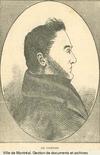-Louis (Saint-Joseph) at Chambly: William in January 1773 and Margaret the next year. In business he used French-speaking notaries and for his construction work he hired several Canadians
saloon and two lots in Barkerville, to Hugh Cochrane, the town’s notary public, who had married her grandniece Leonie Fanny. A codicil which Cochrane persuaded Mme Bendixen to attach to the will was
time attending to the Boucherville seigneury. He had a pleasant manner with those about him, particularly with his family: his domestic relations were indeed most cordial, as is shown by several notarial
.
Mme d’Ailleboust, who was dedicated to the sick in the Hôtel-Dieu of Quebec, gave herself to this institution by notarial contract on 5 July 1670, together with her remaining possessions; she spent
1774. Jean-Baptiste Badeaux, notary at Trois-Rivières, acted as his attorney during his absences as he did
CARDINAL, JOSEPH-NARCISSE, notary, school trustee, militia officer, politician
October 1830 elections by notary Valère Guillet of Trois-Rivières. As a member of the assembly, Caron had experienced one of the worst political crises of the time, connected with the abuses of the
.
Pierre Casgrain and his wife had 13 children, 6 of whom reached adulthood. Being well provided for with a dowry of £1,000, each of the daughters made a good marriage: Marie-Sophie married notary François
.
The notary Charles de Cazes landed at Quebec in 1854 with his wife, Constance Arnaud, and his children. He immediately settled in the Eastern Townships. By a contract drawn up on 11 Oct. 1854
merchant. He established himself at Kaskaskia but apparently retained close personal and commercial ties with his birthplace. His eldest daughter married Montreal notary Pierre-Louis
Chaboillez* and notary Louis Chaboillez*.
Jules Bazin
* Desauniers obtained letters of emancipation and benefit of age for them in 1737.
In 1738 the two young seigneurs named Jean de Latour, a royal notary
holding fur-trading permits. At the bottom of the notarial recognizances are to be found the names of the most important fur-traders of the time.
On 4
, seriously ill, Chartrand dictated a will to notary Jean-Baptiste Constantin of Saint-Vincent-de-Paul. This testament is important because it contains a list of parishes to which Chartrand bequeathed money
particular a symbolic gesture of opposition to the authorities was made by notary Jean-Joseph Girouard*, a captain in the Rivière-du-Chêne
the aforesaid town” so long as he had not proven his right to “assume the aforesaid position,” notarial acts show that Corbin for several years after the conquest bore that title
livres.
The day before her death, which occurred at the Hôtel-Dieu of Montreal on 26 Feb. 1764, she dictated her will to the notary Pierre
Sainte-Anne de-la-Pocatière; on 16 May 1762, before setting off on a long cod-fishing voyage, he drew up a will there in the presence of a notary, leaving most of his belongings to François
and La Patrie, as well as those of notary Victor Morin, political figures such as Sir Lomer Gouin*, Louis-Athanase
-notarial agreement with them, but it is significant that in 1738 he was not mentioned in the public petition of Louisbourg master fishermen and merchants that condemned the practices of his brothers



